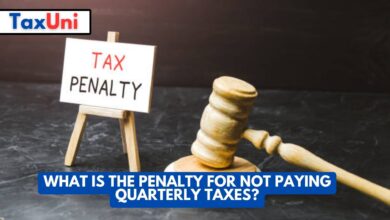Can I Claim Business Expenses Without an LLC?
This article will explore how you can claim these deductions, the types of expenses you can deduct, and the benefits of operating as a sole proprietor.

Contents
- Claiming Business Expenses as a Sole Proprietor
- Types of Deductible Business Expenses
- Benefits of Not Forming an LLC
- Considerations When Operating Without an LLC
- FAQs
- Can I deduct business expenses without an LLC?
- What are examples of deductible expenses?
- Do I need a business license to claim expenses?
- How do I report these expenses?
- Can I claim home office expenses?
- What records should I keep?
- Do I need to pay self-employment tax?
- Does forming an LLC help with deductions?
- Should I consult a tax professional?
Many aspiring entrepreneurs and freelancers often wonder if they can claim business expenses without forming a Limited Liability Company (LLC). The good news is that you can indeed deduct business expenses as a sole proprietor or independent contractor, even if you haven’t registered your business as an LLC. A sole proprietorship is the simplest form of business structure. It does not require formal registration with the state or federal government, making it an accessible option for many individuals starting their own businesses. As a sole proprietor, you and your business are considered the same entity for tax purposes, which means that all income and expenses are reported on your personal tax return.
Claiming Business Expenses as a Sole Proprietor
As a sole proprietor, you can claim business expenses on your tax return using Schedule C (Profit or Loss from Business). This form allows you to report your gross income from the business and deduct any ordinary and necessary expenses incurred in running that business.
Key Steps to Claim Business Expenses:
- Maintain Accurate Records: Keep detailed records of all your business-related expenses. This includes receipts, invoices, and bank statements. Accurate record-keeping will help substantiate your claims if the IRS requests documentation.
- Complete Schedule C: When filing your taxes, complete Schedule C to report your income and expenses. You will list all deductible expenses in Part II of the form.
- Calculate Your Net Income: Your net income is calculated by subtracting total business expenses from your total income. This net income is what you will be taxed on.

Types of Deductible Business Expenses
You can claim various types of expenses as a sole proprietor, provided they meet the IRS criteria of being “ordinary and necessary.” Here are some common deductible expenses:
- Home Office Expenses: If you use part of your home exclusively for business purposes, you can deduct a portion of your rent or mortgage interest, utilities, and home insurance.
- Vehicle Expenses: If you use your vehicle for business purposes, you can deduct either actual vehicle expenses (gas, repairs, depreciation) or use the standard mileage rate set by the IRS.
- Health Insurance Premiums: As a self-employed individual, you can deduct health insurance premiums paid for yourself, your spouse, and dependents.
- Office Supplies and Equipment: Costs for items like computers, printers, office supplies, and furniture used for business operations are deductible.
- Marketing and Advertising Costs: Expenses related to promoting your business—such as website development, online advertising, and promotional materials—can be claimed as deductions.
- Professional Fees: Fees paid to accountants, consultants, or legal advisors for services related to your business are also deductible.
- Continuing Education: Any costs incurred for courses or training that enhance your skills related to your business can be deducted.
Benefits of Not Forming an LLC
While forming an LLC offers liability protection and potential tax advantages, there are several benefits to operating as a sole proprietor without an LLC:
- Simplicity: Operating as a sole proprietor involves less paperwork and fewer regulatory requirements compared to forming an LLC.
- Cost Savings: You avoid the costs associated with forming an LLC, such as filing fees and ongoing compliance costs.
- Direct Control: As a sole proprietor, you have complete control over decision-making without needing to consult with partners or members.
Considerations When Operating Without an LLC
While there are advantages to being a sole proprietor, it’s essential to be aware of potential downsides:
- Personal Liability: As a sole proprietor, you are personally liable for any debts or legal actions against your business. This means that personal assets could be at risk in case of lawsuits or financial issues.
- Limited Growth Opportunities: If you plan to expand your business significantly or seek outside investors in the future, forming an LLC may provide more flexibility in terms of ownership structure and capital raising.

FAQs
Can I deduct business expenses without an LLC?
Yes, as a sole proprietor, you can deduct “ordinary and necessary” business expenses on Schedule C of your tax return.
What are examples of deductible expenses?
Office supplies, marketing, travel, home office use, professional fees, and vehicle costs for business purposes.
Do I need a business license to claim expenses?
No, the IRS does not require a license or LLC to deduct legitimate business expenses.
How do I report these expenses?
Use Schedule C (Profit or Loss from Business) when filing your personal tax return.
Can I claim home office expenses?
Yes, if you use part of your home exclusively and regularly for business purposes.
What records should I keep?
Receipts, invoices, bank statements, and mileage logs to substantiate your deductions.
Do I need to pay self-employment tax?
Yes, sole proprietors must pay Social Security and Medicare taxes on net income.
Does forming an LLC help with deductions?
No additional deductions come from forming an LLC, but it provides liability protection.
Should I consult a tax professional?
Yes, for personalized advice and to maximize deductions while staying compliant with IRS rules.





